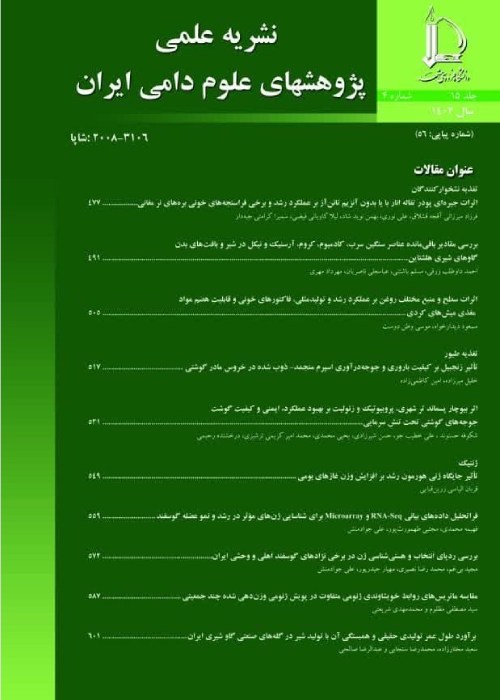Bioinformatics Analysis of Human Milk Protein and Bioactive Peptides alpha s-1 casein Effect on Inhibiting ACE Enzyme and Comparing to Different Mammalian Species
High blood pressure is a dangerous risk factor for cardio-vascular disease, including coronary artery disease and strokes. In the human body, a system called renin-angiotensin system regulates blood pressure, in which the angiotensin converting enzyme ACE plays an important role in increasing blood pressure. Angiotensin I as a converting enzyme (ACE) catalyzes the conversion of angiotensin I to vasoconstrictor angiotensin II, and also inactivates the antihypertensive vasodilator bradykinin. Inhibition of ACE mainly results in an overall antihypertensive effect. Peptides derived from food proteins can have angiotensin converting enzyme (ACE) inhibiting properties. Casein protein in milk or other dairy products such as cheese is a rich source of bioactive peptides. Bioactive peptides are inactive in the main protein sequence and are released in during milk digestion or milk fermentation by proteolytic bacteria or hydrolysis by proteolytic enzymes. Many of these peptides have several biological activities. Casein-derived peptides, such as opioid peptides, antihypertensive peptides, casein phosphopeptides and glycomacropeptides have various physiological roles, including adjusting and lowering blood pressure by inhibiting angiotensin converting enzyme (ACE). Caseocinin peptide has been derived from the casein Alpha S1 protein It has an ACE-inhibiting enzyme inhibitor and low blood pressure. The purpose of this study was to identify the alpha S1 protein casein and bioactive peptides of the angiotensin converting enzyme (ACE) inhibitor in human milk and compare it with different species of mammals.
At first, genomic and protein data for eight different species of mammals (cattle, sheep, camels, horses, humans, ewes and pigs) was collected from the National Center for Bioinformatics Information (NCBI). Physico-chemical properties analysis (atomic state, isoelectric point, half-life, hydrophobicity hydrophilicity , barometric and pH) and - Multiple sequence alignment of of alpha-s1 casein and the bioactive peptides of Casokinin in 8 species of mammals was done using CLC Main Workbench 5 software. Then, the prediction of bioactive peptide alpha s1 casein and its three-dimensional structure was done with the help of the online software ACCLUSTER Server, I-TASSER and GalaxyWEB. The simulation of the Molecular interaction (docking) of alpha-s1 casein and the bioactive peptides of Casokinin with angiotensin converting enzyme ACE in the cell was done using ClusPro 2.0 software online.
the results of bioinformatics analysis of human milk protein with other mammals showed that camel milk has the most similar physicochemical properties of milk to humans and can be a good alternative to human milk in feeding children. The highest and least percentage of amino acid sequence amino acids in alpha-sec1 casein in different mammals with humans respectively is related to camel and Goat. The results of the determination of the position and energy of the connection show that the most suitable binding location with maximum energy is related to human and camel milk. Among the bioactive peptides identified and predicted in eight species of mammals, due to having more proline amino acid in Caseocinin peptide, the camel milk is more resistant than other species. Therefore, the antihypertensive effect in camel milk is greater than other mammals. According to the results, it can be predicted that three-dimensional structure of protein and peptides will have a great effect on antihypertensive properties and it causes a good interaction with the active site of the angiotensin converting enzyme (ACE) and thus inhibits the ACE enzyme and lowers blood pressure. Investigating the performance of alpha S1 protein casein and Caseocinin peptide identified for eight different species of mammals And comparing its results with human milk in inhibiting ACE enzyme With Molecular interaction (Docking) Protein's Bioinformatics Software showed that milk of camels after human milk has the highest performance in Reducing the risk factors for cardiovascular disease such as inhibition of angiotensin converting enzyme (ACE) and blood pressure in preventing the development and progression of cardiovascular disease.
the alpha S1 protein casein and Caseocinin peptide have many biological properties and are very important in the health of the body.It can be said that camel milk is the most similar to human-like physico-chemical properties and It can be a good alternative to human milk in feeding children. The bioactive Caseocinin peptide has pharmaceutical compounds that can be used to treat high blood pressure and heart disease. Therefore, this peptide can be used as superbenefit and natural additives, an appropriate replacement to antihypertensive drugs.
- حق عضویت دریافتی صرف حمایت از نشریات عضو و نگهداری، تکمیل و توسعه مگیران میشود.
- پرداخت حق اشتراک و دانلود مقالات اجازه بازنشر آن در سایر رسانههای چاپی و دیجیتال را به کاربر نمیدهد.


